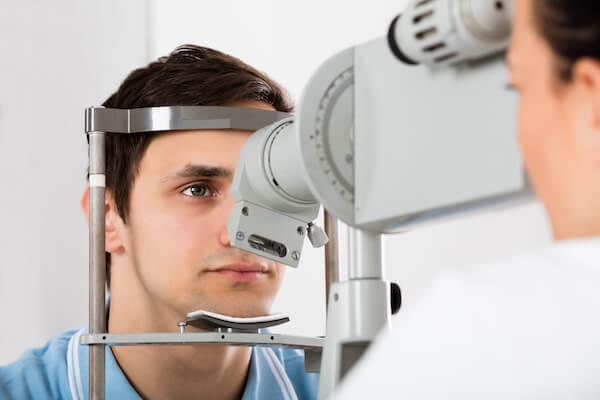National Eye Exam Month
In 1989, Sears Optical established August as National Eye Exam Month to help promote the many benefits of receiving an annual eye exam from an eye doctor at Brevard Health Alliance. Our eye doctors not only evaluate vision and prescribe eyeglasses for all family members but can also identify health problems manifesting in your eyes (hypertension, diabetes and even liver diseases), diagnose cataracts and glaucoma, remove foreign objects from the eyes and recommend vision aids for people with permanent vision impairment.
In addition, getting your eyes checked at least once a year (twice a year for adults over 65) means your eye doctor can detect eye diseases in their early stages and begin treating the disease as soon as possible. Eye diseases like glaucoma, macular degeneration, retinal detachment and diabetic retinopathy do not produce symptoms until they have advanced and possibly caused permanent damage to your vision.
Recognize National Eye Exam month this summer by scheduling check-ups for the family. Brevard Health Alliance does not have eye doctors on staff but if you give us a call, we would be happy to point you in the direction of an eye doctor that would best suit your needs.
Tips for Keeping Your Eyes Healthy
Dilated Eye Exams
When your eye doctor dilates your eyes, special drops are placed in your eyes that make your pupils widen so that light can penetrate to the back of the eye. Once your eye is dilated, an eye doctor uses a lighted optical tool to examine the retina, optic nerve, and macula located deep inside your eyeball. Adults will start receiving dilated eye exams after age 35 due to an increased risk for glaucoma and age-related macular degeneration.
Eating Healthy Foods
Carrots are actually good for eye health but so are fresh vegetables and fruits, especially kale, spinach and other dark green, leafy vegetables. Foods containing omega-3 fatty acids like salmon and tuna also support eye health because omega-3 contributes to maintaining blood vessels and optimal blood flow in the eyes. In addition, being overweight may increase your risk of diabetes and diabetic retinopathy as well as glaucoma. Staying at or within 10 to 15 pounds of the recommended weight for your age and height can further help keep your eyes healthy.
Wear Sunglasses or Other Protective Eyewear
Ultraviolet radiation from sunlight is the primary cause of cataracts and eye cancer. When spending time outside, always wear sunglasses or a wide-brimmed hat to prevent UV rays from damaging DNA in ocular (eye) cells. Although cataracts covering the lens of the eye can be removed and replaced with a synthetic lens, cancer of the eye requires extensive treatment involving radiation/chemotherapy and/or surgery.
Common Eye Disorders Discovered During Routine Eye Exams
Diabetic Retinopathy
If you have diabetes, having your eyes checked regularly at Brevard Health Alliance allows your eye doctor to detect unhealthy blood vessels in the eye that leak fluid into the retina. Without treatment, diabetic retinopathy may cause swelling of the macula and/or a detached retina. Macular swelling could cause permanent vision deficits.
Dry Eye Syndrome
When your eyes do not retain enough moisture due to blocked tear glands, thyroid disease, diabetes or other medical condition, your eyes are susceptible to infections and inflammation interfering with your ability to see clearly. In addition, dry eyes could indicate a serious, underlying disorder that has not yet been detected by your physician.
Macular Degeneration
Adults over 65 are at risk for age-related macular degeneration that affects the center of your retina (macula). When the macula begins deteriorating, you may notice your vision field seems blurry or distorted while your periphery vision remains clear. Although no treatment is available for macular degeneration, your eye doctor can suggest making lifestyle changes or taking nutritional supplements to slow the progression of macular degeneration.
Glaucoma
Higher than normal intraocular (inside the eye) blood pressure can damage the optic nerve if not decreased with medications or surgery to relieve pressure. Glaucoma does not cause any symptoms until the optic nerve has sustained permanent damage. Detection of glaucoma involves measuring eye pressure and the use of an ophthalmoscopy device to examine the interior of your eye for signs of optic nerve damage.
Brevard Health Alliance cares about you and your family’s vision and eye health. Remember National Eye Exam Month this year by scheduling an eye exam at your nearest center today.

















































































































































